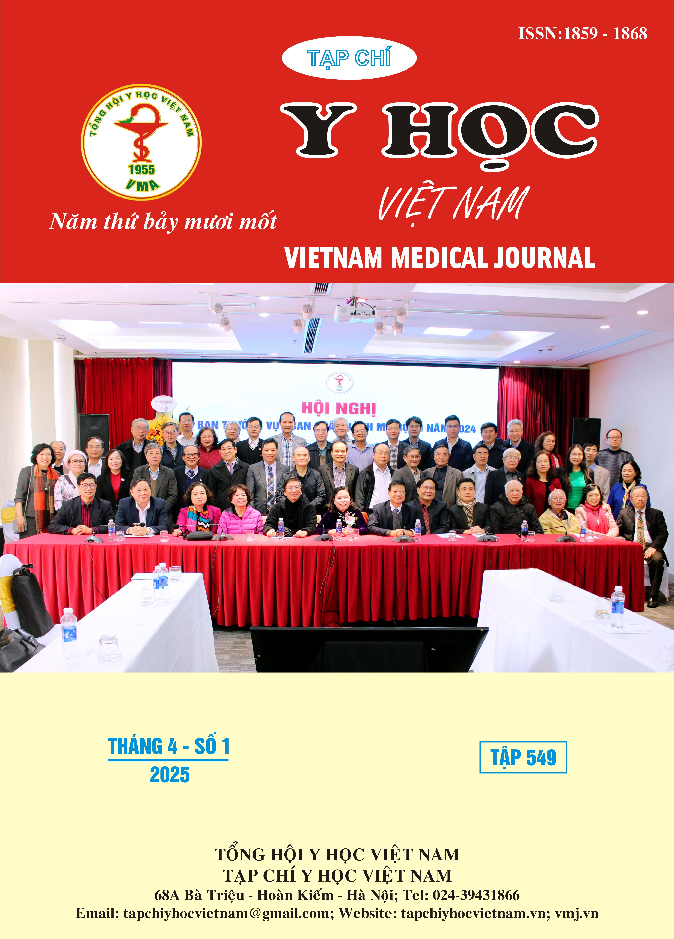CHỈ SỐ TRIGLYCERID - GLUCOSE ỨNG VỚI MỨC NGUY CƠ BIẾN CỐ TIM MẠCH THEO THANG NGUY CƠ FRAMINGHAM VÀ SCORE_VN
Nội dung chính của bài viết
Tóm tắt
Đặt vấn đề: Bệnh nhân (BN) bị xơ vữa động mạch có nguy cơ cao các biến cố tim mạch nặng, bao gồm tử vong do tim mạch, đột quỵ não và nhồi máu cơ tim không tử vong. Chỉ số Triglycerid - Glucose (TyG) được cho là có mối liên quan với các biến cố tim mạch (BCTM) trong tương lai. Mục tiêu: Xác định điểm cắt của chỉ số Triglycerid - Glucose ứng với nhóm nguy cơ trung bình và cao biến cố tim mạch theo thang điểm nguy cơ Framingham (FRS) và SCORE_VN ở đối tượng có yếu tố nguy cơ tim mạch chuyển hóa. Đối tượng và phương pháp nghiên cứu: Nghiên cứu cắt ngang mô tả trên 223 bệnh nhân có yếu tố nguy cơ tim mạch chuyển hóa, từ 40 đến 69 tuổi, tại phòng khám Nội Tim mạch, Bệnh viện Đại học Y Dược Thành phố Hồ Chí Minh cơ sở 1, từ tháng 9 – 12/2024. Kết quả: Diện tích dưới đường cong của chỉ số TyG đối với FRS và SCORE_VN lần lượt là 0,74 (KTC 95%: 0,67 – 0,81; p < 0,001) và 0,67 (KTC 95%: 0,60 – 0,74; p < 0,001). Điểm cắt của chỉ số TyG ứng với nhóm nguy cơ trung bình và cao BCTM theo FRS và SCORE_VN đều là 9,0 (độ nhạy 65,0%, độ đặc hiệu 72,4%, giá trị tiên đoán dương 46,4%, giá trị tiên đoán âm 84,9% đối với FRS và độ nhạy 54,2%, độ đặc hiệu 74,8%, giá trị tiên đoán dương 61,9%, giá trị tiên đoán âm 68,3% đối với SCORE_VN). Kết luận: Chỉ số TyG có giá trị ở mức trung bình trong dự đoán nguy cơ BCTM theo FRS và SCORE_VN với điểm cắt TyG tại 9,0.
Chi tiết bài viết
Từ khóa
Triglycerid - Glucose, Framingham, SCORE_VN, biến cố tim mạch bất lợi chính, hội chứng tim mạch chuyển hóa
Tài liệu tham khảo
2. Group SBR. Risk of fatal coronary heart disease in familial hypercholesterolaemia. BMJ: British Medical Journal. 1991:893-896.
3. Liu Q, Zhang Y, Chen S, et al. Association of the triglyceride-glucose index with all-cause and cardiovascular mortality in patients with cardiometabolic syndrome: a national cohort study. Cardiovasc Diabetol. Feb 24 2024;23(1): 80. doi:10.1186/s12933-024-02152-y
4. Sánchez‐Íñigo L, Navarro‐González D, Fernández‐Montero A, Pastrana‐Delgado J, Martínez JA. The TyG index may predict the development of cardiovascular events. European journal of clinical investigation. 2016;46(2):189-197.
5. Tao S, Yu L, Li J, et al. Association between the triglyceride-glucose index and 1-year major adverse cardiovascular events in patients with coronary heart disease and hypertension. Cardiovasc Diabetol. Nov 8 2023;22(1):305. doi:10.1186/s12933-023-02018-9
6. Wang L, Cong HL, Zhang JX, et al. Triglyceride-glucose index predicts adverse cardiovascular events in patients with diabetes and acute coronary syndrome. Cardiovasc Diabetol. Jun 13 2020;19(1):80. doi:10.1186/ s12933-020-01054-z
7. World Health Organization. Noncommunicable diseases country profiles 2018. 2018:218.
8. Xue Y, Xu J, Li M, Gao Y. Potential screening indicators for early diagnosis of NAFLD/MAFLD and liver fibrosis: Triglyceride glucose index-related parameters. Front Endocrinol (Lausanne). 2022;13:951689. doi:10.3389/fendo.2022.951689


